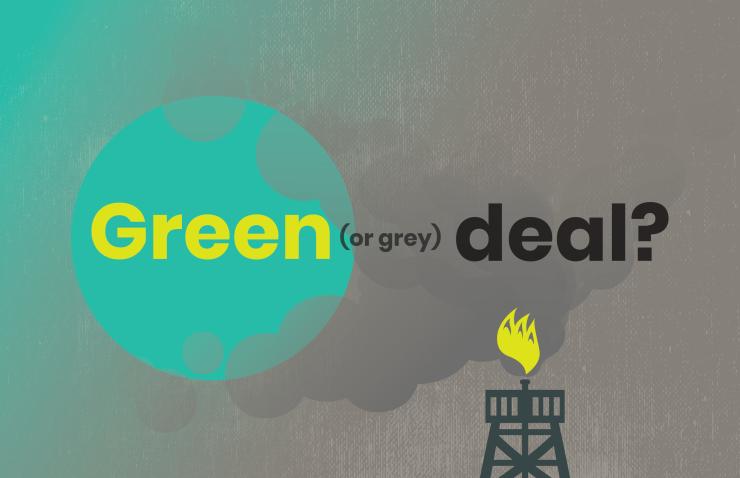The European Green Deal: impact and responsibility in Africa.

The European Green Deal is the European Union’s (EU) strategic plan to take the lead on climate change and make Europe the first climate-neutral continent by 2050.
The European Green Deal was presented by the President of the European Commission at the beginning of her term of office (December, 2019) and sets out concrete measures covering all sectors of the economy with the intention of reducing CO2 emissions into the atmosphere and reversing the effects of rising temperatures that continue to break records year after year.
The Covid-19 crisis has made even more necessary the urgency to develop the European Green Deal and promote its lines of action in all sectors of activity. The pandemic, with a worrying mutation of the virus, has provoked the most important economic, social and health crisis of the century, and many scientific studies point to environmental degradation as the origin of the pandemic.
The exponential increase in the exploitation of natural resources, coupled with climate change, threaten biodiversity and become risk factors for new infections in the future.
The European Green Deal has its scope of application in the EU, but for its proper implementation it requires a transformation of two essential factors. Firstly, there is a need for a progressive transformation from a consumption-driven economy to a new form of circular economy that transforms and recycles natural resources.
Secondly, new ways of obtaining clean energy without CO2 emissions into the atmosphere need to be developed. However, in order to achieve the objectives of the Green Deal, the EU needs to work together with other continents and regions that also enable economic transformation in their territories.
Otherwise, the EU’s efforts will be in vain and will lead to a new form of green inequality. It would be of no use for Europe to achieve net-zero greenhouse gas emissions if other countries do not carry out the necessary transformations within their economies.
The climate emergency proclaimed by the European Parliament is not exclusive to the EU. The African continent, where only 4% of the world’s greenhouse gases are emitted, is the continent most affected by the consequences of climate change.
In Africa, extreme weather phenomena such as torrential rains that erode the soil and cause food shortages, intense heat waves that make it impossible to develop agriculture and livestock farming as a traditional way of life for the people, or devastating droughts that threaten food security and biodiversity, are intensifying more frequently.
These concatenated situations of climate catastrophes require intergovernmental collaboration to reverse the effects of global warming. The fight against climate change must be coordinated and requires joint economic transformations that address the root causes and promote a clean, zero-emission economy that protects the environment and improves people’s well-being.
What is the point of promoting sustainable, environmentally friendly forms of transport in Europe or setting limits on pollutant and carbon dioxide emissions in the automotive sector if we sell our oldest and most polluting cars to Africa? What is the point of creating a circular economy with clean energy in Europe if we continue to promote a commodity-dependent economy in Africa? What is the point of the EU moving towards an economic transformation based on renewable energy sources if we do not give Africa a chance for a fair energy transformation?
Negotiations on a new agreement between the EU and Africa are more than a year behind schedule. It is not the pandemic that has been the main factor behind the delay, but the EU’s desire to impose its priorities on the agenda of the negotiations.
The EU still sees the African continent as the ideal place to obtain raw materials and sell its products, but without granting it any consumer rights. Seeking joint priorities means moving in parallel towards real common objectives such as covering green transition; digital transformation; sustainable growth and jobs. The intention to include other elements such as peace, security and migration control as priorities in the EU-AU agreement is to include the EU’s problems as a priority for the African continent. And they are not.
The European Green Deal must be seen as the big deal for all. Any form of international cooperation agreement between Europe and Africa must be cross-cutting and motivated by the joint efforts of the two continents to develop an environmentally friendly economy.
Joint EU and AU strategies must therefore focus on infrastructure investments that promote greener forms of transport, international trade agreements that address the needs of the two continents, economic initiatives that encourage the transformation of the unsustainable consumer economy into circular economies, as well as the incorporation of binding agreements for businesses that promote and respect the environment (and human rights).
The EU’s green deal and the economic transformation it entails cannot omit the environmental impact of its economic activity in developing countries and especially in Africa.
The transformation of the EU economy has direct effects on millions of people in Africa and despite its good intentions, the EU must be accountable for the impact of its transformations. The Green Deal will be for everyone, or it will be for no one.
José Luis Gutiérrez Aranda,
Trade Policy Officer,
Africa Europe Faith and Justice Network (AEFJN)



